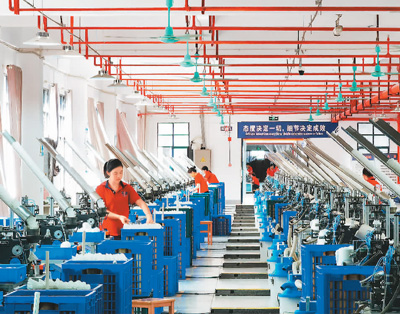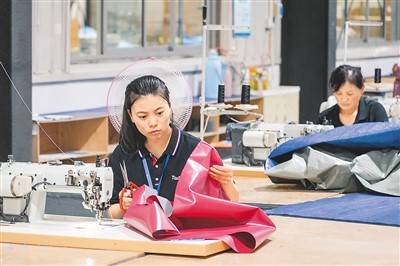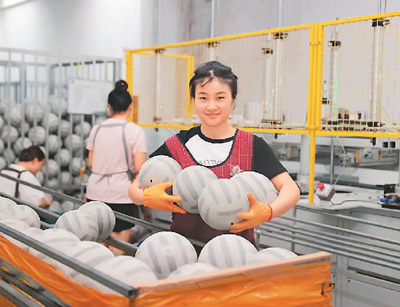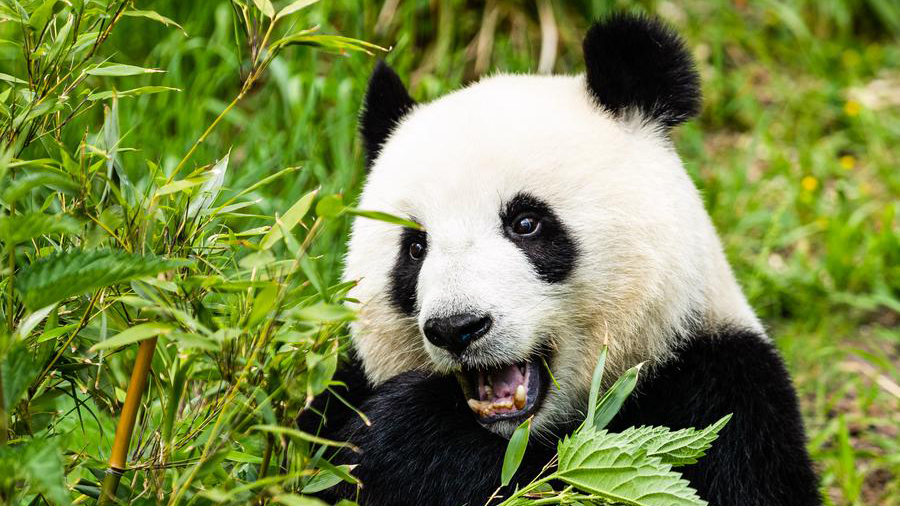China sees rapid growth of sporting goods exports

Employees of a company produce badminton shuttlecocks in southwest China's Guizhou Province. (Xinhua/Xiang Dingjie)
The exports of China's sporting goods and equipment surged 16.7 percent year-on-year in the first half of 2024, outpacing the overall export growth during the same period by a whopping 9.8 percentage points, according to data recently released by the General Administration of Customs (GAC).
Data from the World Trade Organization showed that global trade in sporting goods has nearly tripled in almost 30 years, and China has become the world's top exporter of sporting goods.
In Jinping county of southwest China's Guizhou Province, a global production hub for badminton shuttlecocks, more than 100,000 shuttlecocks are sold worldwide a day.
"We've calculated that about one in every 10 shuttlecocks in the world comes from Jinping," said Hu Bing, production manager of Guizhou RSL Sports Culture Development Co., Ltd.
Last year, the company produced over 4 million dozen shuttlecocks, generating a staggering output value of 340 million yuan ($47.73 million) and exporting nearly $9 million worth of shuttlecocks to over 60 countries and regions, Hu noted.
The first half of 2024 saw the company achieve even more remarkable growth, with the output value of shuttlecocks reaching 185 million yuan and exports skyrocketing by around 40 percent compared to the same period last year.

Workers produce wrestling mats in a workshop of Taishan Sports Industry Group Co., Ltd. in east China's Shandong Province. (Xinhua/Zhu Zheng)
In the first quarter of 2024, China's exports of footballs, basketballs, and volleyballs saw a year-on-year increase of 33.57 percent in volume and 17.99 percent in value, while that of table tennis, badminton, and tennis equipment increased 0.93 percent from the same period last year to $204 million, according to GAC data.
In the first three months of this year, the country's exports of roller skates and skateboards surged 30.85 percent and 50.21 percent year-on-year, respectively. The inclusion of skateboarding as an Olympic sport has further fueled demand, particularly in countries like Russia and Japan.
In addition, treadmill exports jumped by 44.94 percent year-on-year in the first quarter, while artificial turf exports grew by 15.64 percent from the same period last year.
To boost the pace of "going global," Chinese sporting goods companies need to rely on greener sporting goods with higher technological content, said Bao Mingxiao, director of the China Sports Policy Research Institute at Beijing Sport University.
Dingqi Sports Goods (Huai'an) Co., Ltd. in Huai'an city, east China's Jiangsu Province specializes in the production of ball bladders, including those used in the production of footballs, volleyballs, basketballs and rugby balls. 70 percent of its products are exported overseas. For the Paris Olympics, the company exported products made from 70 percent bio-based materials.

A worker holds football bladders for the Paris Olympics in a workshop of Dingqi Sports Goods (Huai'an) Co., Ltd. in Huai'an city, east China's Jiangsu Province. (People's Daily/Wang Hao)
"This type of football is equipped with a chip capable of making 500 identifications per second to assist in determining a handball or offside instances," said Zhou Hongda, general manager of the company, adding that it produces ball bladders made from recycled and bio-based materials.
Since the start of this year, the company has exported 4.07 million balls for training and games, including those used in the UEFA European Championship, Copa America, and the Paris Olympics.
Zhou believes that the key to the popularity of "Made-in-China" sporting goods overseas lies in continuous innovation, higher technological content, and adapting to new market demand.
Wen Jia, deputy general secretary of the China Sporting Goods Federation, said fierce competition in the domestic market makes enterprises and merchants provide customized and personalized products and services by meeting customer demand and leveraging technologies.
The booming sports event economy has attracted buyers across the world to purchase all kinds of sporting goods in Yiwu, known as the "World's Supermarket" in east China's Zhejiang Province. In the city, the improved efficiency of customs supervision provides a strong boost for Chinese companies to go global.
Chinese enterprises are not just exporting sporting goods, but also technology, services, and brands.
"Many foreign clients recognize our manufacturing capabilities and hope to introduce Chinese production technology to their own countries. Our future may not solely involve product exports, but also technology, service, and brand exports," said Yang Lei, general manager of the foreign trade department at Hebei Jadeqi Sports Goods Co., Ltd.
"Our overseas strategy aligns with the Belt and Road Initiative. We not only produce products but also offer services and comprehensive solutions, facilitating integration with other industries and making our operations more convenient. Recently, we've been considering building a production base in Serbia, having just visited there, and found the environment and market conditions favorable," Yang added.
Photos
Related Stories
Copyright © 2024 People's Daily Online. All Rights Reserved.









